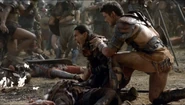| Castus | ||
|---|---|---|
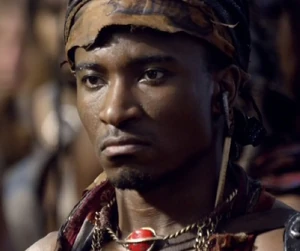
| ||
| First appearance | S3E03: Men of Honor | |
| Last appearance | S3E10: Victory | |
| Profession | Pirate (Heracleo's Command) Rebel (Spartacus' Command) | |
| Race | Numidian | |
| Relationships | Heracleo (Leader, deceased) Adherbal (Comrade, deceased) Agron (Rival/Comrade) Nasir (Friend) Spartacus (Friend, deceased) Tryphon (Comrade, deceased) | |
| Status | Deceased (Killed by Roman soldier) | |
| Actor/Actress | Blessing Mokgohloa | |
Castus is a Numidian pirate and the right-hand man of Heracleo. He later joins the rebellion after his allies' betrayal.
Appearance
Castus has a youthful appearance and holds a well-toned athletic build. He wears attire similar to that of the other pirates and is always seen with his hat on, leaving what his hair looks like as a mystery. Castus also wields a kachin dao at his side and will use a spear if necessary.
Personality
Castus is cheerful and charismatic, having a bold way with words. He enjoys drink and fun and in his own words "but seeks to live life to the fullest measure". Despite his boisterous attitude, he has also been shown as fearless, fierce, violent and confrontational which was shown during his fight with Agron. Unlike the other pirates, Castus has a sense of honour and shows great loyalty to those he has comitted himself to.
Combat Prowess
Having spent his life as a pirate, Castus has picked up and learned several combat skills and techniques. Adept in the use of a sword, hand to hand Castus is also skilled in using a spear, with deadly purpose. Though not professionally trained, Castus proves himself an expert warrior shown during his brief but fierce fight with Agron which shows his skills are above that of an average Roman soldier or Rebel and that he is a skilled asset to those who fight alongside him.
War of the Damned
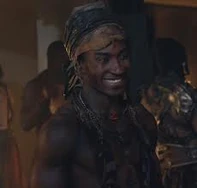
Castus smiling.
Castus arrives in Sinuessa along with his leader Heracleo and fellow pirates, Adherbal and Tryphon. When the pirates and the rebels share drink together, he takes an interest in Nasir who is, himself, stricken by Castus' way with words. Agron sees this and becomes jealous and when Castus makes a rude remark about Agron's people, it leads to a fight between the two. Agron gains the upper hand, but the fight ends on Spartacus' orders.
Castus is present with Heracleo and others during the exchange outside of the city between the pirates and rebels to ensure an agreement. When Tiberius, Sabinus and their force attacks, Castus takes up arms and together, the rebels and pirates see their mutual foe defeated.
He remains in the city, taking part in the drinking and gambling that occurs among the rebels. Spartacus seeks him out when looking for Heracleo. During this time, it becomes clear that Agron still harbors an immense grudge against him, much to the pirate's amusement.
When Crixus spurs the rebels into a frenzy resulting in the slaughtering of the surviving Romans, Castus goes with Nasir to report it to Spartacus. Agron is noticeably angered that the two came together and leaves with Spartacus. During this time, Castus appears to show his own disdain for the rebels slaughtering the Roman prisoners, showing his own morality.
Before Caesar and Heracleo's attack on Spartacus at the port, Castus is seen vomiting on a wall at the city's plaza. Here, he accidentally moves in front of a walking Caesar who pushes him aside, causing Castus to fall to the floor where he remains unconscious for a while.
Castus reappears, fighting the Romans with Nasir and Lugo in the streets of the city. Here, he saves Nasir from being struck down by a Roman soldier by stabbing the soldier with a spear. When Agron charges at him, Castus attempts to defend himself, but Agron breaks his spear, leading to a standoff, forcing Nasir to ask why Agron was doing that since Castus came to his aid. The German accuses Castus of being part of Heracleo's plot, but he adamantly denies it by saying he awoke from drink to find his comrades gone. Nasir says Castus had no hand in the attack, but Agron remains unconvinced. When Lugo says more Romans are approaching, Agron threatens to kill Castus if he attempts to grab a weapon. While the city's evacuation is taking place, Crixus sees him, calls him a traitor and tries to attack him. Nasir quickly defends Castus, saying he knew nothing of his ally's plot. Spartacus says there is no time to place accusations and orders that Castus' hands are tied and he is escorted out by Nasir.
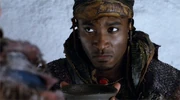
Castus as a prisoner.
Castus remains with the rebels, his hands still tied together. Whilst in this state, he is ridiculed and beaten by Brictius before Nasir stops him. Despite his status as a prisoner, Castus still attempts to charm Nasir who is still showing no interest. Castus says if he was free, he would aid in taking down Crassus. He puts out his tied hands. However, Nasir, looking at an observing Agron, says he cannot free him. When a storm hits, Castus is approached by Nasir and Agron who, when seeing Castus, asks whether he is "never to be free of this fucking shit". the two go to Castus who says Spartacus has commanded him there. Agron takes out his knife and cuts Castus' ropes. Confused, Castus asks why he freed him to which Agron replies that it was act born of Nasir's plea.
During the attack on Crassus' wall, Castus kills many Romans on the wall and joins his new comrades in attacking the camp where he saves Agron from being cut down by a Roman who was about to kill the German. Agron acknowledges this with a nod and the two continue fighting the Romans. When Crassus and a clutch of men come to investigate the attack, Castus and the Rebels ambush them by shooting arrows and throwing spears at the Romans before they retreat when Crixus taunts them for their cowardice. Castus takes part in the celebration.
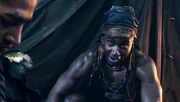
Castus still attempts to charm Nasir.
Following the rebels escape from the snowy mountains, Castus' place in the rebellion is still tentative. He continues to charm Nasir despite the latter's disinterest, however, Castus notes that Nasir does harbour similar sentiments. Regardless of the case, the two continue to converse with friendly banter.
When Spartacus and Crixus eventually decide to take separate paths, Castus chooses to remain with Spartacus in order to take the path over the Alps to escape the Republic.
Castus becomes quite prominent amongst the rebels, acting as their lead scout upon horseback. He comes to Spartacus and lets him know of an incoming rider that turns out to be Naevia who lets them know of their loss against Crassus as well as Crixus' death.
To honour the fallen, Spartacus has the rebels create a makeshift arena where a select group of rebels would fight against captured Romans ad gladium. Castus takes to being a spectator and watches in amazement as Nasir easily defeats a Roman.
When the rebels receive trade of 500 survivors for Kore (initially for Tiberius), Nasir stands saddened that he cannot see Agron among them. Castus comes up to Nasir and points out Agron who is among the living. During Crixus' pyre, Castus stands witness when the rebels begin chanting the names of their fallen. He joins in the chanting when the rebels begin to chant the name of Crixus and Spartacus saying they will defeat Crassus.
As Spartacus and the others are seeing off the non-combatant rebels, Castus approaches him on horseback and accounces that he has spotted Crassus and his army approaching.
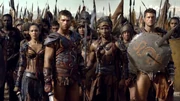
Castus, ready for battle.
As the army gathers to meet Crassus, the rebels are approached by Rufus who announces that Crassus desires to meet with Spartacus first. Spartacus takes with him his elite, Castus included, to this meeting. Spartacus eventually dismisses his group as Crassus does to speak in private. Castus and the others then leave and allow the two leaders their time.

Castus, receiving his mortal wound in battle.
When the final battle is to take place, Castus takes a combatant role on the front lines next to Agron and Nasir. He also remarks how large the Roman army is to Spartacus. Castus fights well, but is caught off guard by a Roman on horseback, receiving a large gash across his chest. As he is being cradled by Nasir, Castus looks at Agron and states "Would that I had been you [Agron] for but a day." He then dies of injuries which inflames both Agron and Nasir to continue fighting.
Historical Context
Castus' character is named after a real rebel in Spartacus' historical rebellion, who was either one of the rebel generals or in command under Gannicus himself, having been closely associated with the latter. Conflicting sources on Castus' historic background say he was either a Roman who had served in the Roman legions, who deserted and was later enslaved, and recycled as a Gladiator in the school of Gnaeus Cornelius Lentulus Batiatus in Capua, or that he was a Celtic slave who like many slaves was given another name, usually as a way to quell their native pride. Whether he was a Gladiator and escape Batiatus' ludus with Spartacus, Crixus, Oenomaus and Gannicus or not, Castus joined the rebellion, later serving as a prominent leader during the slave uprising known as the Third Servile War (73-71 BC), given that his name (whether his real name or not) is recorded in the sources.
In the winter of 71 BC, Castus, along with Gannicus, broke off from Spartacus, taking over 10,000 (sometimes recorded as 12,500 rebels), primarily Celts and Germans. This marked the second break off of the rebellion. Castus and Gannicus met their end in Lucania, near Mount Soprano (modern Mount Camalatrum) where Crasus' commanders Lucius Pomptinus and Quintus Marcius Rufus (Rufus in the show) entrenched their forces in battle and defeated them.
Other than the name, and him fighting against crassus in the last few episodes, Castus in the show is completely different to the historical Castus.
Trivia
- Castus is one of the few rebels in Spartacus' army who was not a slave, others being Lucius Caelius, and Laeta who was an upper-class Roman noble before being branded a slave by Heracleo and Marcus Licinius Crassus.
- Castus was the 19th main character to be killed and the last of the Cilician pirates to die.
- According to his actor, Blessing Mokgholoa, the tattoo on Castus' abdomen is a log of pirate conquests. The tattoo on his arm is a relic of his heritage, pre-Cilicia.
- The Latin word for pirate was pirata which itself originates from the Greek word peirates, meaning the same.
Quotes
[To Spartacus] "Apologies, if you fell to confusion."[1]
[To Nasir] "The fault lies only in the times that we live. And in the gods, that they turn away from the suffering of good men."
"Would that I had been you for but a day." [To Agron, last words][2]
Gallery
References
<references>
